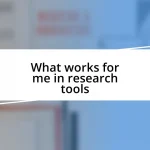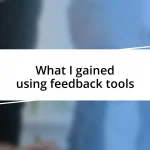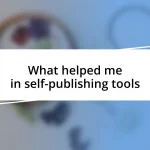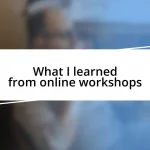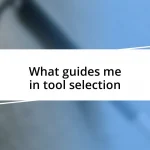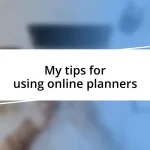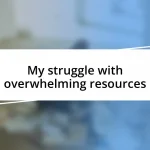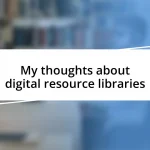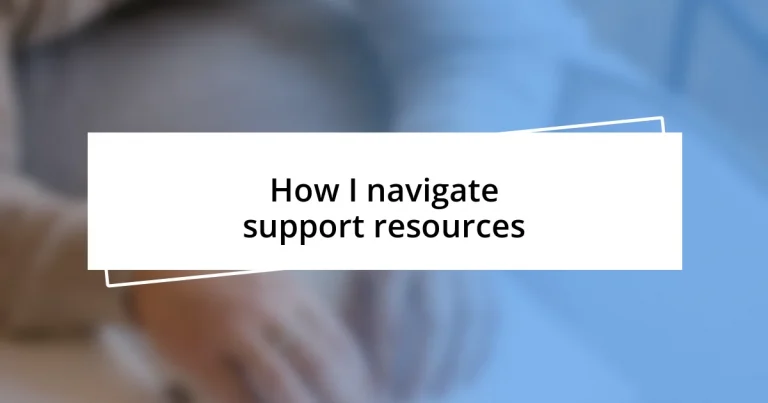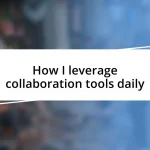Key takeaways:
- Understanding and identifying personal needs is crucial for effectively utilizing support resources, enabling individuals to seek tailored assistance.
- Exploring diverse support options, such as community centers and online tools, can lead to valuable connections and enhance personal growth.
- Building and maintaining a support network through consistent engagement fosters resilience and mutual encouragement in navigating challenges.
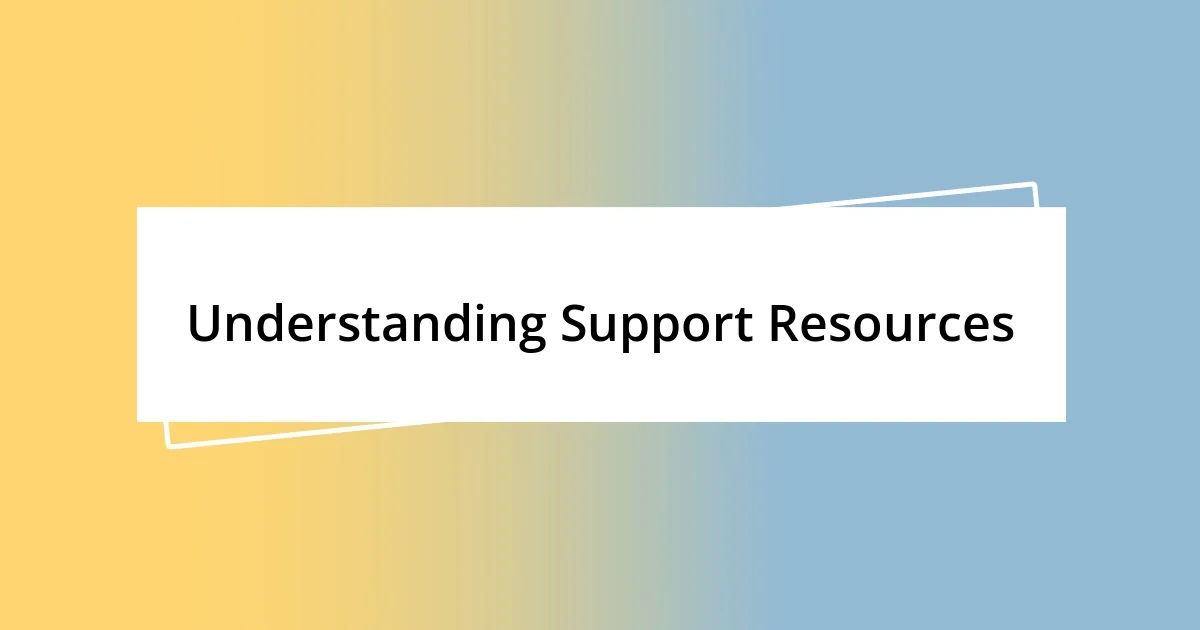
Understanding Support Resources
Understanding support resources is essential for navigating life’s challenges. When I first faced a difficult situation, I felt overwhelmed and unsure where to turn. I remember discovering that there was a local community center offering support services; the relief I felt when realizing I wasn’t alone was profound.
Support resources can take many forms, from professional counseling to peer support groups. I’ve often found that talking with others who have similar experiences can create a sense of connection and validation. Have you ever felt comforted just by sharing your story with someone who understands? That’s what these resources aim to provide—a space for healing and support.
It’s not just about accessing help; it’s about recognizing the diverse options available to us. There are hotlines, forums, and local organizations that cater to different needs, and exploring them can be an empowering experience. I once attended a workshop at a support center that connected me with a mentor. Their guidance opened doors I didn’t even know existed. So, what resources have you considered exploring in your journey?
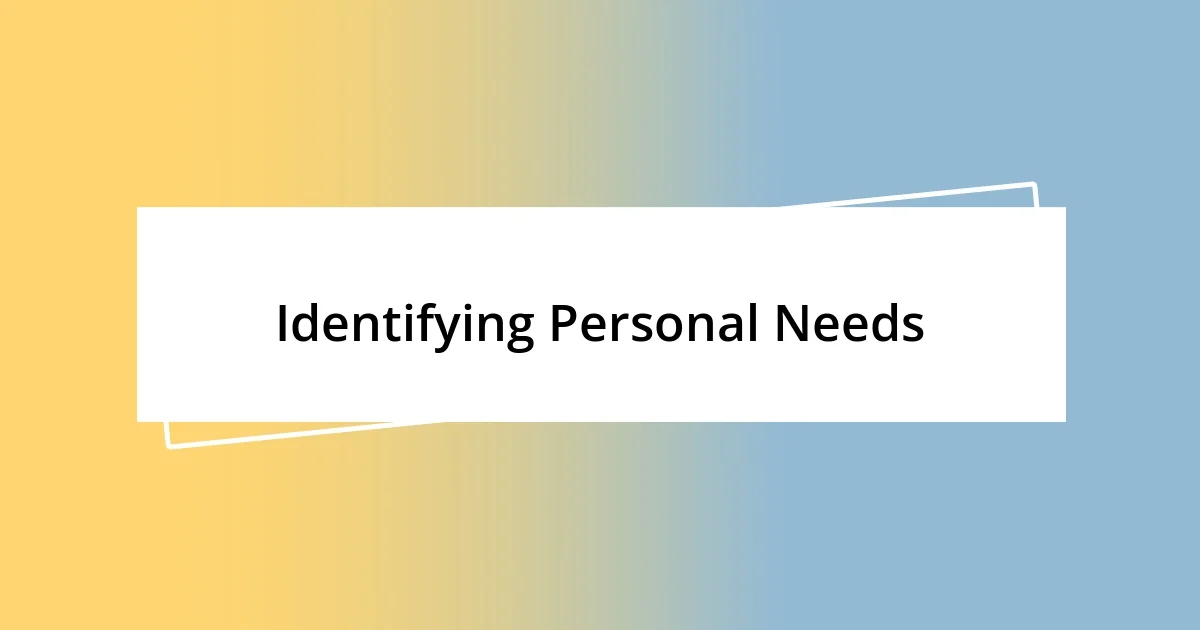
Identifying Personal Needs
Identifying personal needs is a crucial first step in effectively utilizing support resources. I recall a time in my life when I felt utterly lost, and it took a deep reflective moment to pinpoint what I truly needed. I realized that it wasn’t just about being heard; I needed specific tools and strategies to cope with my anxiety. Once I acknowledged this, I could actively search for resources that addressed my particular situation.
In my experience, articulating my needs made all the difference. I remember sitting down with a journal, sketching out what I was struggling with—like finding companionship or guidance. This process illuminated the types of support I needed, be it group therapy, one-on-one counseling, or even skill-building workshops. Have you ever tried writing down your feelings? It can uncover so much clarity about your needs and lead you to the right resources.
Another effective way to identify personal needs is to reach out to trusted friends or mentors. I once spoke with a friend who had navigated similar challenges, and their insights helped me see areas I hadn’t considered before. They encouraged me to seek not only emotional support but also guidance in professional development. This perspective broadened my understanding of what I truly required. Sometimes, engaging in conversations can unearth valuable perspectives you hadn’t realized existed.
| Need Type | Description |
|---|---|
| Emotional Support | Help in coping with feelings and emotions. |
| Skill Development | Resources to develop new skills for personal growth. |
| Professional Guidance | Assistance from experts in a particular field. |
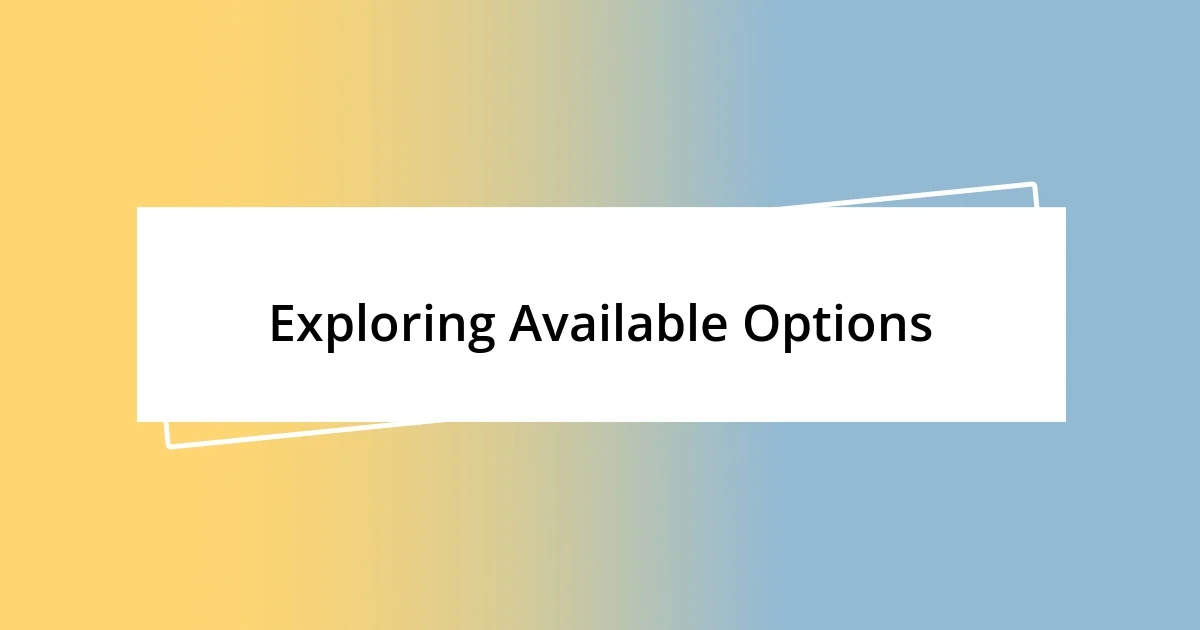
Exploring Available Options
Exploring the available options for support resources can feel like finding your way through a maze. I remember feeling so lost after a particularly tough breakup, but when I started looking, I discovered a treasure trove of resources at my fingertips. Local libraries often host free workshops and events that connect individuals with similar struggles. It’s incredible how much support can come from just stepping outside your comfort zone and seeking out what’s in your community.
Here’s a brief list of avenues to consider when exploring support options:
- Community Centers: Often provide diverse programs, from counseling to recreational activities.
- Online Forums: Safe spaces to share experiences and gain insights from others who understand your challenges.
- Support Hotlines: Confidential assistance that can offer immediate help and guidance at any hour.
- Workshops and Classes: Opportunities to build skills or gain knowledge while connecting with others.
- Social Media Groups: Virtual communities where shared stories can foster a sense of belonging.
Each of these options offers its own unique benefits, and I’ve found that just dipping a toe into different avenues can lead to unexpected connections and resources I hadn’t anticipated.
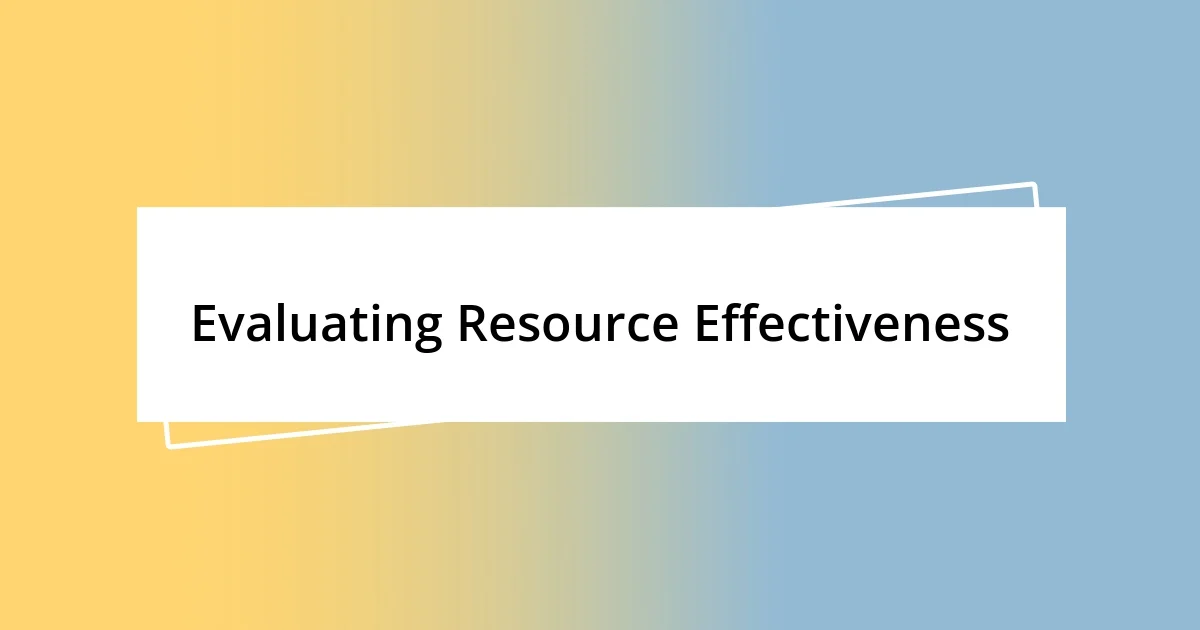
Evaluating Resource Effectiveness
Evaluating Resource Effectiveness
When assessing the effectiveness of support resources, I always start by reflecting on how those resources made me feel. For instance, after attending a workshop on mindfulness, I noticed a tangible shift in my anxiety levels. It wasn’t just about gathering information; it was about how the experience resonated within me. Have you ever left a workshop feeling lighter, as if a weight had been lifted? That’s the kind of impact to look for.
Another key aspect is tracking tangible outcomes. After trying a few online support groups, I decided to keep a journal of my progress. This allowed me to identify what worked and what didn’t—much like a personal experiment. I found that some groups fostered connections that made me feel more understood, while others didn’t quite fit my style. Isn’t it enlightening to realize that not every resource will be the right fit for you?
Lastly, feedback from others can be incredibly valuable. I remember sharing my experiences about various resources with a close friend, and it opened up a deeper discussion about what truly supports us. Their perspective helped refine my approach and led me to explore avenues I hadn’t considered. It’s amazing how a conversation can illuminate the effectiveness of resources you’re evaluating, isn’t it? Engaging with others not only fosters growth but often brings new insights into the evaluation process.
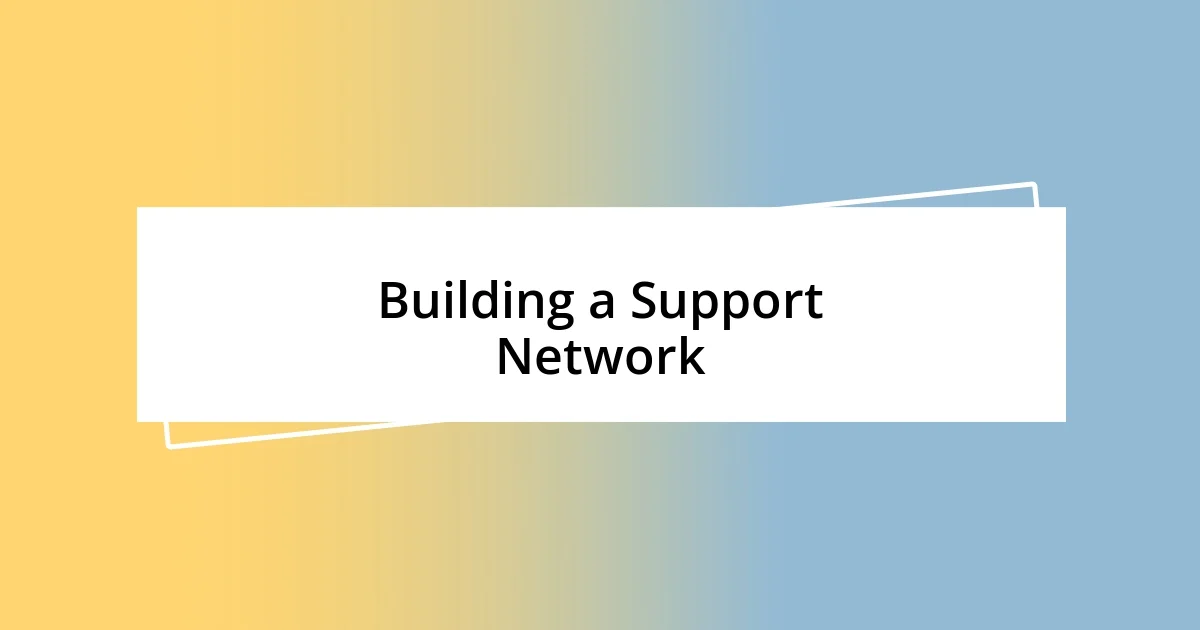
Building a Support Network
Building a support network is like weaving a safety net; each connection strengthens your security. I vividly recall reaching out to an old colleague during a difficult time. It wasn’t just about seeking help; it felt incredible to reconnect and share our struggles. Have you ever chatted with someone and suddenly felt a weight lift? That’s the power of authenticity in relationships.
Another essential component is diversifying your support sources. I remember joining a local hiking group as a way to cope with stress. Not only did I get exercise, but I also formed friendships with people who understood my journey. Isn’t it amazing how a shared activity can foster connections? Each member brought unique experiences and stories, enriching my understanding of resilience.
Finally, it’s important to nurture these relationships over time. I make it a point to check in regularly with my support network, whether it’s a quick text or coffee catch-up. This consistent engagement keeps the connections fresh and meaningful. Have you ever noticed how a small effort can reap significant rewards in relationships? The beauty of a support network lies in its reciprocity; we lift each other up, creating a cycle of encouragement that can be truly transformative.
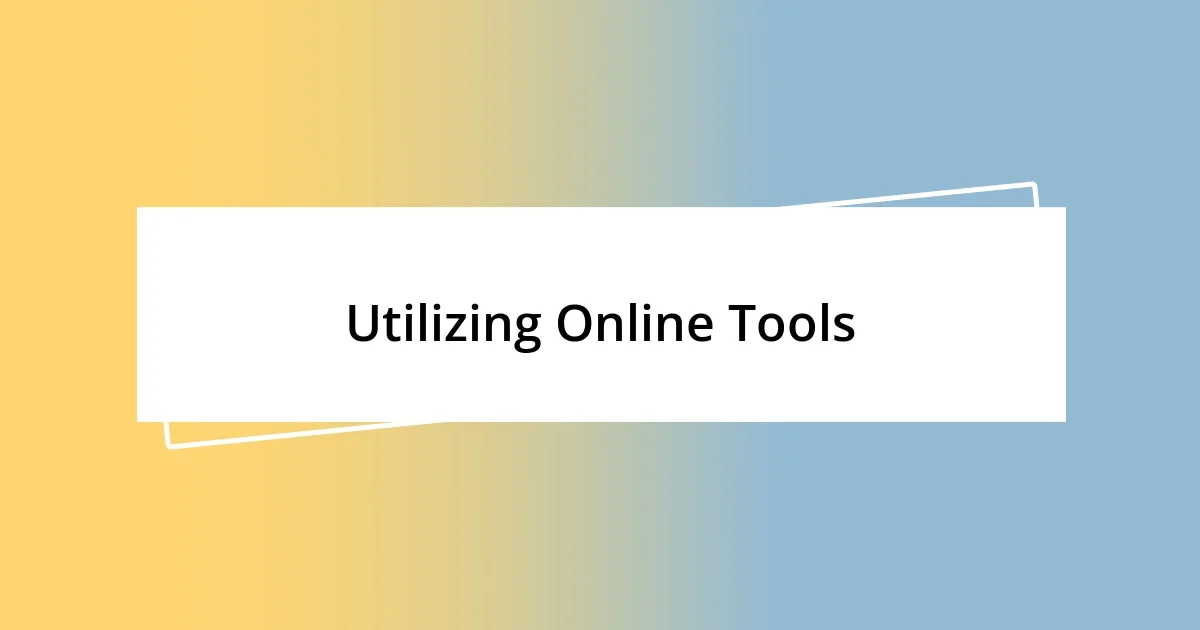
Utilizing Online Tools
When I first ventured into the world of online tools for support, I was overwhelmed by the options available. One platform that genuinely stood out was a mental health app I discovered, which offered guided practices and community forums. I remember feeling an immediate sense of relief as I explored its resources, realizing I wasn’t alone in my struggles. Have you found an online tool that resonated with you in a similar way?
Diving deeper, I also utilized video tutorials that helped me develop coping strategies. One particular series about managing anxiety made me feel connected to the instructor, almost like having a comforting friend right there with me. It’s incredible how digital interactions can mimic real-life connections, isn’t it? I always find it valuable when a tool offers a personal touch, elevating the experience beyond just information.
Additionally, I made it a habit to read reviews and forums before committing to a new online resource. This practice allowed me to tap into shared experiences before diving in myself. There were times I hesitated, only to discover later that these tools became instrumental in my growth. Reflecting on your personal experiences before trying something new can sometimes lead you to the perfect fit—have you ever been surprised by what you don’t initially expect? The beauty of exploring online tools is that they often lead us to discover new facets of ourselves.
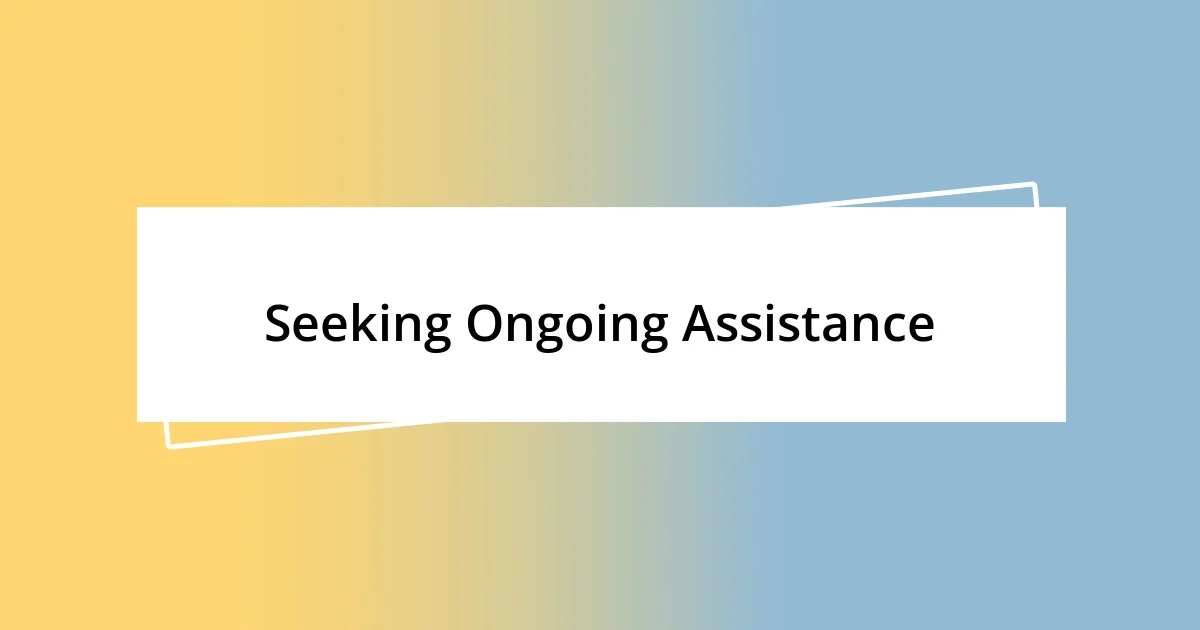
Seeking Ongoing Assistance
When I think about seeking ongoing assistance, I’m reminded of a time when I joined a support group that met every week. At first, I felt hesitant and even skeptical about opening up in a room full of strangers. But as the sessions progressed, I discovered the power of shared experiences; it was refreshing to hear others articulate feelings I had grappled with in silence. Have you ever found solace in the stories of others?
Maintaining that connection was crucial. I remember making it a priority to attend not just for my own sake, but to support others who were also sharing their journeys. There’s something uniquely uplifting about being there for someone else—it’s like a beautiful exchange of strength. It often struck me how ongoing assistance wasn’t just a lifeline; it was a mutually beneficial relationship that grew deeper over time.
Additionally, I found it helpful to set specific “check-in” reminders on my calendar, prompting me to reach out to fellow group members outside of our meetings. The simple act of sending a text or making a call felt like a tiny investment with enormous emotional returns. Have you ever experienced a moment where just checking in on someone brought a little light into both your lives? Seeking ongoing assistance is all about those small gestures that reinforce connections and support each other’s journeys.
